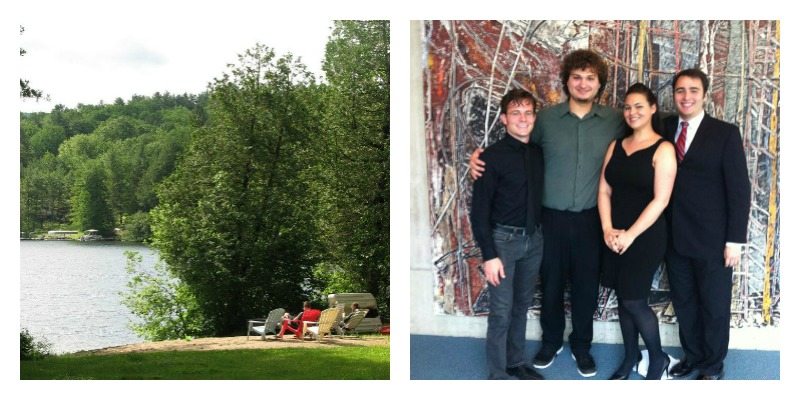Greetings, fellow Sybaritic devotees! Like the diva herself, I am committed to the creation and performance of new music, and I recently spent two weeks at a program accomplishing just that. She’s allowed me to share my experiences with you, and I couldn’t be more thrilled to do so! Onward…
[youtube=http://www.youtube.com/watch?v=6pwbpuMfL9E&w=560&h=315]
Desire – Tom Cipullo (performed by fellow NMOP 2013 attendee Jason Weisinger)
The Basics
“Summer afternoon—summer afternoon; to me those have always been the two most beautiful words in the English language.” – Henry James
While Ms. Sybarite Fantastique was making Chicago sit up and take notice, I sought artistic fulfillment on a tranquil lake in the Vermont countryside at New Music on the Point. Prior to the program’s start, the approximately 20 composers selected were given a set instrumentation and a limit of 12 minutes; then, the performers had a few weeks to prepare the pieces. Upon arrival, everyone was thrust into an intensely collaborative experience, where open communication between composer and performer was fostered and honed, with guidance from faculty. The final products made their premieres on final concerts at the University of Vermont, in Burlington.
Throughout this process, we received daily seminars, master classes, and coachings from resident and visiting faculty. For the performers, this was on our assigned pieces, as well as compositions by the visiting faculty; for the composers, this was on other works of their own making. In attendance this year were composers Kathryn Alexander (also the NMOP co-founder), Jason Eckardt, Michael Klingbeil, Tom Cipullo, Daron Hagen, Gilda Lyons, and Yehudi Wyner; mezzo-soprano Jennifer Beattie; tenor Paul Sperry; coach Donna Loewy; and instrumentalists from the International Contemporary Ensemble. The rustic nature of the camp placed everyone on equal footing-mealtime chats with faculty were common, and being in close proximity to such a high quality pool of talent made it seem more attainable. (Yours truly tends to be a wallflower with creative mentors, and this aspect of NMOP definitely worked to break that habit.)

This aspect, combined with the off-the-grid location, locally-sourced and freshly prepared communal meals, and the encouraged lake recreation (a fleet of small watercraft was available any time) created a feeling of retreat – a comfortable, relaxed environment meant to stimulate personal growth. Even the nightly Salon Concerts, where the student performers could showcase their skills, felt less like a performance and more of a sharing of talent among friends. As a result, I could absorb everything NMOP had to offer, which led me to a couple of valuable insights.
(I would be remiss if I left out the best unexpected perk – unlimited chocolate milk.)
[youtube=http://www.youtube.com/watch?v=xJ3hJ0Bha54&w=480&h=360]
Trailer for Amelia – Daron Hagen (from Seattle Opera premiere)
Know Thyself
“Solve to your own satisfaction your concept of your own voice.” – Daron Hagen
While this statement was primarily directed at composers (who made up half of the student body at NMOP), I found it applied to singers as well. One of the common threads found in the faculty seminars was knowing what makes you (your voice/work, etc.) special and significant. From the student instrumentalists and the members of ICE, this was evident in the bold exploration of the limits of their instruments (example: this performance of Marcelo Toledo’s Qualia II, featuring ICE member Rebekah Heller). For the composers, this entailed determining their influences and setting clear intentions. “See yourself in a tradition,” said Tom Cipullo, whose arching phrases and use of rubato clearly reflected Puccini (see his heartbreaking “The Garden,” from Of a Certain Age).
For the singers, this meant breaking from the traditional concept of Fach – we had to see ourselves not as a marketable package to opera audition panels, but stripped down to our basic skills of vocal expression. Many of the compositions we encountered incorporated a variety of styles, dependent on the composer’s background and tastes. I found my affinity for folk music lent itself to the music of Gilda Lyons, who draws inspiration from her dual heritage of Irish and Nicaraguan – her use of ornaments, passages without vibrato, and unaccompanied voice felt familiar to me. It got me thinking about exactly how I use my voice, and the most effective way to express something; of looking at the page and using the clues left there to determine the composer’s ideal sound, and using my collective faculties to achieve it.

Collaboration is Key
“I know that books seem like the ultimate thing that’s made by one person, but that’s not true…Every reading of a book is a collaboration between the reader and the writer who are making the story up together.” – John Green
I lucked out with attending NMOP this year – the faculty varies each season, and this year just happened to be particularly voice-friendly. Each one had something distinct to say about communication between singers and composers. All of them placed emphasis on respect – the composer’s respect for the capabilities of the human voice, as well as the effort involved in producing those sounds (which was really quite nice to hear – makes me want to work harder to realize their art!). Searching for and employing the most effective language was also a top priority; Lyons said: “My personal challenge as a composer is to put less and less on the page without sacrificing my artistic vision.”
I’ll leave you with one last anecdote – another lesson in the collaborative process, this time between performers. One of my assigned pieces was beautifully written (by the talented Peter Kramer), with use of extended techniques in all of the instruments (voice, violin, and piano). We had rehearsed it to the point where we were comfortable with our parts, and we had enough rapport between us to carry the piece. In our last rehearsal before the dress, Jennifer Curtis (violinist and composer; attended NMOP 2013 as a part of ICE) watched our first run-through, and then made a suggestion: the violinist (Alexandra Matloff) should set aside her music, and just use the basic themes of each section to play off of my line. Clare Longendyke’s confident delivery of the piano part provided a backbone for me to follow, and Alex took the plunge with Jennifer and improvised over my part, using Peter’s alternately wispy and stagnant figures to accent my disjointed text. The result was an entirely unique experience – we had taken Peter’s piece and redefined our roles to create something really special. We used this new order in the final performance, with Peter’s blessing; it remains one of the high points of my time at NMOP.
“If you can see yourself going there, say yes.” – Gilda Lyons
[youtube=http://www.youtube.com/watch?v=Pkb01Mkj-84&w=480&h=360]
Death Valley – Jennifer Curtis
Thanks for reading! Now back to your regularly scheduled programming…

As an upcoming singer in the Baltimore area, Hillary LaBonte has appeared with hexaCollective, the Vivre Musicale series, Great Noise Ensemble, the Mobtown Modern series, the Handel Choir of Baltimore, at the Baltimore Basilica, and the Nation’s Capitol. Roles include Isabel (El Capitan), Mrs. Anderssen (A Little Night Music), Ann Putnam (The Crucible), and Cupid (Semele). In 2010, she was the recipient of the Phyllis Bryn-Julson Award for the Commitment to and Performance of 20th/21st Century Music.
Hillary grew up in Kaneohe, Hawaii. She is a graduate of Baldwin-Wallace College and the Peabody Conservatory. This year, she continues to establish herself in light opera and new music, singing at the New Voices @ CUA Festival with Great Noise Ensemble, and the roles of Yum-Yum in The Mikado (Loudoun Lyric Opera and Victorian Lyric Opera Company), Zara in Utopia, Ltd. (VLOC), and in the chorus of HMS Pinafore (Young Victorian Theatre Company).
